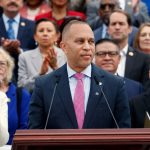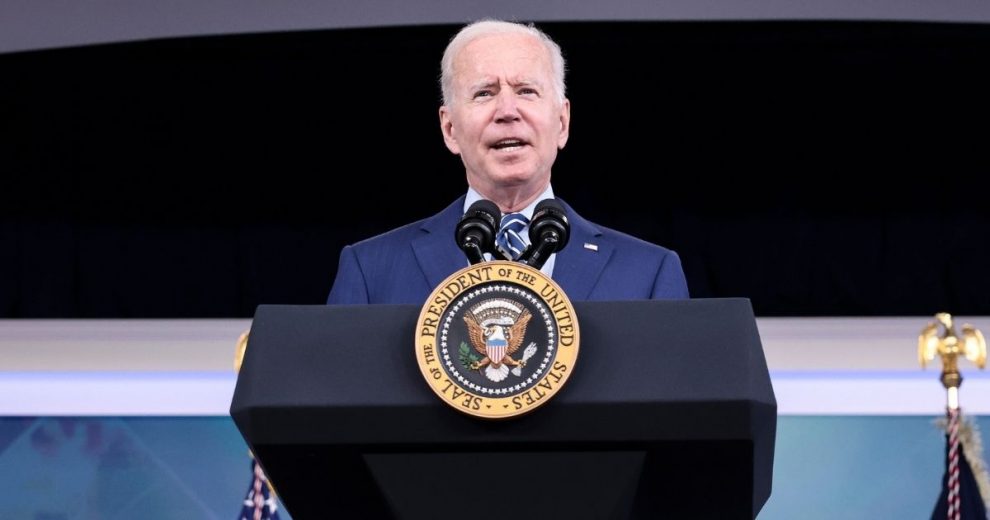Several days after the fall of Kabul on Aug. 15, President Joe Biden sat for an interview with ABC’s George Stephanopoulos. He insisted he had not been advised by his military to leave a small number of troops in Afghanistan to keep the country from falling to the Taliban.
“Your top military advisers warned against withdrawing on this timeline. They wanted you to keep about 2,500 troops,” Stephanopoulos said.
Biden abruptly cut him off. “No they didn’t. It was split. That wasn’t true. That wasn’t true.”
“They didn’t tell you that they wanted troops to stay?” Stephanopoulos asked.
“No, not in terms of whether we were going to get out — in a time frame — all troops. They didn’t argue against that,” the president said.
Stephanopoulos tried again. “Your military advisers did not tell you, ‘No, we should just keep 2,500 troops. It’s been a stable situation for the last several years. We can do that. We can continue to do that’?”
Biden answered: “No. No one said that to me that I can recall.”
FLASHBACK: In August, Biden insisted that “no, no one” advised against his withdrawal timeline.
Today under oath, Generals Milley & McKenzie confirmed they recommended against Biden’s withdrawal timeline and warned him about the impending collapse of the Afghan government. pic.twitter.com/HejzUb5FIf
— RNC Research (@RNCResearch) September 28, 2021
In addition to the fact that Biden’s remarks didn’t sound particularly convincing, two of his top military advisers contradicted him in testimony before Senate lawmakers on Tuesday morning. And a third testified he was sure the president had “received this input.”
Defense Secretary Lloyd Austin, Chairman of the Joint Chiefs of Staff Gen. Mark Milley and Gen. Frank McKenzie, head of U.S. Central Command, addressed members of the Senate Armed Services Committee on Tuesday.
Both Milley and McKenzie said they had recommended leaving 2,500 troops in Afghanistan to prevent the Taliban from taking over the country, according to CNN.
Milley told lawmakers: “In the fall of 2020, my analysis was that an accelerated withdrawal without meeting specific and necessary conditions risks losing the substantial gains made in Afghanistan, damaging US worldwide credibility, and could precipitate a general collapse of the Afghan government, resulting in a complete Taliban takeover or general civil war.”
The Joint Chiefs Chair said his view all along was “that we should keep a steady state of 2,500 and it could bounce up to 3,500, maybe, something like that, in order to move toward a negotiated solution.”
McKenzie echoed Milley. According to Fox News, McKenzie told the committee, “I won’t share my personal recommendation to the president, but I will give you my honest opinion and my honest opinion and view shaped my recommendation. And I recommended that we maintain 2,500 troops in Afghanistan.”
The Joint Chiefs Chair said his view all along was “that we should keep a steady state of 2,500 and it could bounce up to 3,500, maybe, something like that, in order to move toward a negotiated solution.”
McKenzie echoed Milley. According to Fox News, McKenzie told the committee, “I won’t share my personal recommendation to the president, but I will give you my honest opinion and my honest opinion and view shaped my recommendation. And I recommended that we maintain 2,500 troops in Afghanistan.”
It’s abundantly clear: Joe Biden and Kamala Harris ignored the advice from the military and mislead the American people.
Biden’s botched Afghan withdrawal could have been prevented and American lives could have been saved. https://t.co/wUCd3C0xt0
— Ted Cruz (@tedcruz) September 28, 2021
Milley also told the senators, “I think that our credibility with allies and partners around the world, and with adversaries, is being intensely reviewed by them to see which way this is going to go. And I think that ‘damage’ is one word that could be used.”
I think so too.
Notably, both Milley and Austin blamed the Doha agreement negotiated by the Trump administration with the Taliban in February 2020 for a precipitous drop in the morale and the performance of Afghan troops.
This issue was raised when senators questioned why the Biden administration didn’t have a better sense of the limitations of the Afghan forces, according to CNN.
“It’s my judgment that the Doha Agreement did negatively affect the performance of the Afghan forces in particular by some of the actions the government of Afghanistan was required to take as part of that agreement,” McKenzie said. “[The Doha deal] did affect the morale of the Afghan security forces.”
This is more an excuse for poor judgment than a cause of the debacle. Biden has repeatedly blamed the chaotic U.S. exit on the Trump administration’s peace deal with the Taliban.
In fact, The Associated Press explored the veracity of that claim days after the fall of Kabul and found it lacking in substance. Its fact check determined that Biden was not bound by the Doha, Qatar, agreement. The deal contained an “escape clause.”
“The U.S. could have withdrawn from the accord if Afghan peace talks failed,” the AP wrote. “They did, but Biden chose to stay in it, although he delayed the complete pullout from May to September.”
Former President Donald Trump and his officials were realistic. In defense of the Trump administration’s efforts, it must be said that they were well aware of the forces they were dealing with. They were always clear that the Taliban would be monitored and “conditions on the ground” would determine the path forward.
All along, Trump warned of significant military retaliation if the Taliban reneged on its obligations.
His administration was criticized for giving legitimacy to a terrorist group, but the Taliban is such a dominant force in the country, how could it have been otherwise? The U.S. and the Afghan government could ignore the group at their peril.
Biden was so determined to get out of Afghanistan that he ignored the most important words in the Doha agreement: “conditions on the ground.”
The Doha deal had not been ratified by Congress and it could and should have been changed as conditions changed. Biden had no problem with changing any other policy and program implemented by the Trump administration.
Sen. Cotton asks Milley why he hasn't resigned over Afghanistan.
"The president doesn't have to agree with that advice. He doesn't have to make those decisions just because we are generals. This country doesn't want generals figuring out what orders we are going to accept."— Punchbowl News (@PunchbowlNews) September 28, 2021
The other excuse offered by the generals was that the collapse happened so quickly. What they believed would take months occurred over 11 days, they claimed.
But that’s just not true.
Story cited here.
























